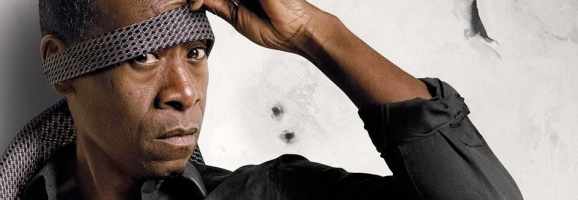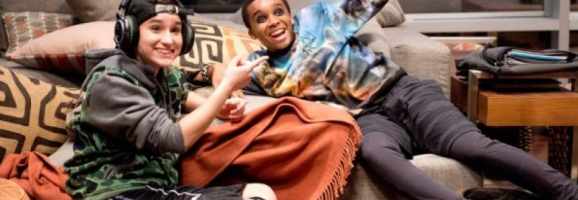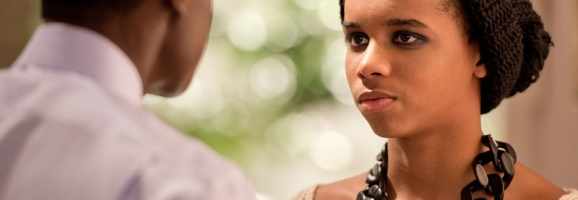House of Lies: Perks and Pitfalls of the Exploration of Pansexuality and Gender Expression

More and more often in film, TV, and literature we are seeing sexual orientation portrayed as being a spectrum instead of as being comprised of definitive categories (which is the notion our society most often perpetuates). One show that currently promotes such a view is House of Lies. House of Lies is a satirical take on corporate America, featuring a team of management consultants who take any means necessary to obtain and retain clients. The show’s reception has been itself been on a spectrum, with some folks who despise the show for its lack of novelty and depth along with its overuse of unnecessary sex, and other folks (like me) who adore the show for its raw and satirical humor, its colorful characters, its stimulating exploration of pertinent issues (race, sex, gender, etc.) and its commitment to kink.
There is such a wide array of intriguing characters: Marty Kaan (played by Don Cheadle), who is famous in the world of management consulting because of his ability to never fail to persuade clients to just take the deal; Jeannie van der Hooven (played by Kristen Bell) who is his right-hand woman, and who has a lot of psychological issues but also a form of resilience that keeps her dominating in the business along with the men. The list of characters goes on, of course. Perhaps the most intriguing character is Marty Kaan’s son, Roscoe.
In the first season, Roscoe was perceived by most viewers as a being a bisexual cross-dresser. He dresses in girl clothes and wears makeup. He likes a boy and a girl simultaneously, he tries out for the female lead in a school play, and he tries to kiss a boy at school and is accused of sexual harassment. In the second season, we see him developing a sexual attraction towards Jeannie, followed by his attempts to win her affections. In both seasons, he is sweet, and caring, he’s completely unique, and he doesn’t care about societal norms.

In the third season, more layers of complexity are added to Roscoe’s character. Roscoe tells his dad that he has met someone, “Lex”. Given the androgynous nature of the name, Marty displays an obvious uncertainty about whether his son’s new “friend” is a boy or a girl, but he doesn’t press for further information, because he doesn’t want his son to think it matters (or, more correctly: he doesn’t want his son to think he thinks it matters). That’s what is so cool about the role Marty has taken on as Roscoe’s father up to this point—while he sometimes seems uncomfortable and hesitant about some of Roscoe’s choices (and we have witnessed this from their first interactions in season one) he is hardly ever unsupportive and he doesn’t usually try to make fusses out of the things he perceives as not normal.
After Marty meets androgynous looking Lex, he asks his son if Lex is a boy or girl, and Roscoe explains that Lex is a “boiiii” or a “grrrrrl” (hopefully, that comes across well phonetically) and that she was born a girl but prefers to express himself as a boy. Knowing that the two (Roscoe and Lex) are sort-of dating, Marty asks Roscoe, “So what does that make you?” He is obviously hoping for some sort of self-defined label, but Roscoe responds with a smile and a confused look and says, “Roscoe?” Labels are irrelevant to him.

Still, audience members continue to wonder…what is Roscoe? What, in plain terms, is his sexual orientation? What can we label him as being? AfterEllen did an interview with Donis Leonard Jr. (the kid who plays Roscoe) and Matthew Carnahan (the creator of the show), discussing the fluidity of sex and gender in the show. Donis Leonard Jr. describes feeling “honored” to be able to play a role of a character who is so comfortable with himself. When AfterEllen asks if Roscoe’s sexuality has been clarified, Donis says, “Roscoe is Roscoe. He’s too young to put a pushpin in him.”
Although the show and those associated with the show have not offered a label for Roscoe, we might presume him to be pansexual, or as being sexually oriented towards people of all sorts, regardless of their gender identities or their biological sexes. The Roscoe/Lex relationship supports this thinking. Perhaps Roscoe shouldn’t have a label: labels often do more good than harm (as Donis’ quote infers). But, if we can use labels in the effort to disturb thinking that is dictated (and caused to be narrow) by other labels, then we might consider doing so. Promoting the term pansexual is a rhetorical move to promote alternative thinking—thinking beyond the definitive categories that the man/woman binary encourages.
As long as we continue to use the terms gay, straight, and bisexual—we might be excluding certain individuals from groups (intersexed, transgender, transsexual, etc.) from the choices these terms offer. With gay, straight, and bisexual—you either like men, women, or both—there is no in-between or beyond. Roscoe isn’t influenced by the man/woman and gay/straight/bisexual categories: he thinks between and beyond them. Should the audience members (specifically the audience members unfamiliar with the sex and gender-related topics explored) be given a label so that they might more effectively work through and explore some of the ideas that this show is promoting? Or would this label limit their thinking? This is an interesting question to ponder.
When AfterEllen asked Matthew Carnahan about his inspiration for including Roscoe, he said that he has friends with a genderqueer son, who he’s “watched grow from a child into a remarkable person who had the incredible good fortune of never being pushed in any one direction, so he gets to be uniquely himself.” He says that that was his goal for Roscoe, “…to let Roscoe be uniquely himself.” His reason for including the Roscoe/Lex relationship in the third season was to “show the importance of what’s in your heart rather than what’s between your legs…”
In the latest episodes of the show, we see Marty struggle to accept his son’s relationship with Lex. Marty is no longer the “cool” father we saw before who allows his son to do what he wants without expressing disapproval or his perception of his son’s “un-normalness”. In one recent episode, he refers to their relationship as a “circus”, and in the latest episode (which came out this past Sunday, February 23) he seeks to end their relationship because he views it as Roscoe retaliating against him (against his fathering). Indeed, when you read Matthew Carnahan’s blog post regarding his motives for including Roscoe as Marty Kaan’s son, he reveals that the decisions that went into the creation of Roscoe revolved around the need to create a character that would “unbalance” Marty’s character:
“When I set out to write a son for Marty Kaan, Don Cheadle’s ethically challenged character on House of Lies, I thought, “What kind of kid would just undo this guy? What kind of kid would unbalance and upend Marty? What kind of kid would take him out of his role as smug superman who can solve any “case” using a variety of consulting tricks and genuine analytical genius?” And I came up with Roscoe, based loosely on several children I’ve met over the years whose gender identities have come differently from those of the majority of their peers. He’s a kid who’d rather play Sandy than Danny Zucko in Grease — for now. And in creating a challenge for Marty, I’ve also encountered a barometer for the varying attitudes and preconceptions of the audience. An entire segment of the audience simply dismisses Roscoe as gay. Another immediately jumps to pushing him into a transgender role. Some just think he’s weird. How about this: he’s just Roscoe.”

It will be interesting to see the direction this show takes from here with regards to the sex/gender/sexual orientation topics. While it seems that Matthew Carnahan apparently has good intentions behind his portrayal of Roscoe (and Lex), there is also a worry about their gender and sexual explorations being portrayed as symptomatic rather than natural. This is often the case with portrayals of characters crossing “typical” sex and gender boundaries in television and film (and some literature—although literature does a much better job with these sorts of things). Think of, for example, the transsexual character on Sons of Anarchy—who is shown to have acquired her transgender “condition” as a result of child molestation. There were arguments about whether the inclusion of such a character was helpful or hurtful to the transgender community.
While there are cases of transgender being circumstantial (as is the case in SOA), there are also completely natural cases of it. Does the media help the transgender cause when transgender is only portrayed in a “symptomatic” light? Here this question must also be asked with regards to other sex and gender related topics. Does the portrayal of Roscoe as using his gender and sexual exploration as a means to call out to his unavailable father help to disrupt audience members’ “typical” and limiting notions of sex, gender, and sexual orientation? Or does this portrayal just make Roscoe’s explorations seem to be no more than symptomatic of his being a neglected child? Does this whole scenario help or hurt the cause?
Roscoe is a tremendous and fresh character, possessing qualities that surely make him a favorite to many. But it seems that we need more characters like Roscoe, who really are just “Roscoe”—just because. No reason. Naturally. There are people like Roscoe in the real world, and they are the way they are because they weren’t pushed in any one direction (as Carnahan’s friends’ son was), because they were born that way, etc., and not because they became that way as a cry for help or as a result of unfortunate circumstances. If shows stop making these kinds of topics of a symptomatic nature, this might lead to more of these so-called “issues” being normalized (or, at least, being more accepted or tolerated).
A lot of us can appreciate what Matthew Carnahan had to say about what’s in your heart being more important than what’s between your legs. We can only hope the show delivers this message somewhat well (or, from an optimistic stance, we can hope the delivery does really well, although as this article shows some of us may have doubts). And from here perhaps more writers will join the effort to make this message known. My personal takeaway from my experience with sex, gender, and sexual orientation: How you define yourself is more important that how you are predefined, and loving (and lusting) for a person should arise not because of what they are, but because of who they are.
What do you think? Leave a comment.











House of Lies one of my favourite shows and I totally love Roscoe’s character!
The show has lost it’s flare, but I’m trying to stick it out because the one thing I do still love is the Marty/Jeannie saga. The characters are so different this year, and not in a good way. For instance Doug went from being a rambling dork to being a complete douche, and Monica went from being this super clever, dark, complicated villainess to just being an evil, loud lunatic. All just very odd. Seems like new writers indeed.
I enjoyed season one more. It was lighter and had more humor. This season is darker and it’s less focused on the job itself.
It’s really a different show. By design I assume. Guess they figured they needed a little retooling. I wish they left it the way it was. I do not hate the new tone, I just thought the old tone was much more fun.
Season one was episode to episode base. Season two has more of a season approach. In season one it was go in for the job and solve it. Here some of the problems seem to be streching over a few epsiodes. Season 1 had one main story – the merger. Season 2 has the new management, Marty quitting, Marty love affair with Jeanie, Marty beating, Marty’s love affair with Tamara, MArty’s brother problem.
It seems that Season 2 has many parallel stories going on simultaneously which doesn’t mean its a bad thing, but they made them all too serious which outbalances the fun and lightness of the series.
To me the enjoyment comes with the personal drama–Marty vs. his ex wife, Marty vs. Tamara, Marty vs. his bosses at Glen Stern or whatever it’s called, Marty vs. his brother. I also like the Clyde/Doug dynamic, and the Marty/Jeannie dynamic.
I think both seasons are great for different reasons. Season 1 was an introduction season, it certainly had more funny scenes to it (I definitely agree) but we were introduced to the characters at face value (except for Marty maybe). The show needed some more character development, and context for these characters..otherwise it would have been extremely one dimensional… so that’s where S2 comes in.
I think honestly, S1 and S2 should have been one season and then it wouldn’t be so bad because this show is far too short for its complexity.
season 1 was a mess, ruined by all the “talking to the camera while everyone else is frozen” moments. i barely returned to season 2.
season 2 was much more mature and organized. better story, better way to deliver the story.
season 3 is all great.
well done. now this is a good tv show.
For me, season 2 was WAY better than season 1. It was definitely a different change of pace but I thought it was steered in the right direction. It was still hilarious and yet very dramatic at the same time. A show that can pull off both drama and comedy at the same time, and do it well for that matter, can be brilliant. Much like Shameless, another Showtime show, that does the same dramedy routine- it is a great show and season 2 brought it to new heights.
While I did think that Season 2 was better than the first, I won’t totally dismiss the first season. I especially liked the part where Marty kicked the plane flown by whatshisname back to where it had come from. That was brilliant, I thought. I also liked the ending of the first season better than the ending of the second. However, yes, season 2 was stronger overall.
I actually think season 2 is better. In fact, I think they’re on a great roll right now.
Season 3 has been great. they got back to what made season 1 so good. the power plays and the business maneuvering less of the personal stuff. Jeannie seems like she is going to play a big role in this season.
The writing is atrocious. The overacting is annoying as hell. The characters are all reprehensible people. I’m done. Better ways to waste 22 minutes than this crapola.
I think the overacting is kind of central in the portrayal of the characters. They’re not meant to be liked in the usual fashion (like, It’s Always Sunny). They’re disingenuous, cold blooded salesmen who try to pitch the best game over the competition.
Which is ironic because the cast of It’s Always Sunny is exactly a cast of “disingenuous, cold blooded salesmen,” with just great jokes.
I have to agree that it has become unwatchable. Gone is character development, story, and anything resembling humor. The characters have become caricatures of themselves (even though some of them have pretty much always been caricatures). Everything that was funny about the first season has become tedious, and any resemblance to actual consultants has been lost — I know because I’m married to a consultant.
A good story needs to be developed very quickly, or I’m no longer on board. This is the first Showtime series I think I’ve ever given up on mid-season, but the show has become boring, which is the kiss of death in television.
Thank you for writing this! Wow this is crazy! This show has NO buzz!
What a wonderful article!
Great article! Hitting topics rarely discussed.
I had no idea this character/element even existed in House of Lies. May have to give it a watch now!
I love Roscoe’s character. I believe his portrayal in the show is helpful because it isn’t associated with his “daddy issues”. Yes, he has an emotionally unavailable father, but their relationship is shown as being extremely strong, despite Martie’s unavailability. The show does a good job of showing a father trying to understand his son’s identity and struggeling with it, while also loving him and accepting him. He doesn’t try to change Roscoe, he simply tries to understand and be supportive. Sometimes, he fails, other times he does an extremely good job.
Interesting article and an interesting perspective
I seemed to have missed this article when it was first posted. Anywho, I loved House of Lies after watching seasons one and two. The dichotomy of characters and the gender bending perspective provided by Roscoe was very interesting. I’m still not sure how I feel about the ambiguous nature of Roscoe, but after reading your post, I have a new-found understanding for his purpose on the show.
I think it’s odd that when people discuss trans individuals they avoid saying where they are in the process. Have they had the surgery? Is Roscoe attracted to a boyish, all-anatomical female? Or is Roscoe attracted to another boy that’s got a few traces of female around? Or are they just friends hanging out a lot – an emotional intimacy between guys that doesn’t have to be sexual? That’s where we get the answer to what we’re attracted to. You can see a Southeast Asian girl-man and initially mistake them for a woman, but when you get under the hood realize that’s not what you’re into. Or Roscoe could be into that cross: the boyish appearance and behavior, but female anatomy. I guess as our ability to speak about the subject matures, we’ll be more open and accurate about what’s actually attractive to the people in question.
Bisexuality is not binary. Please do not promote this idea.